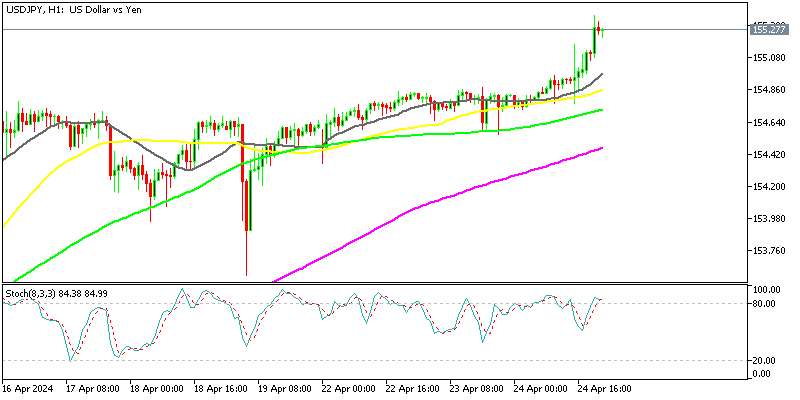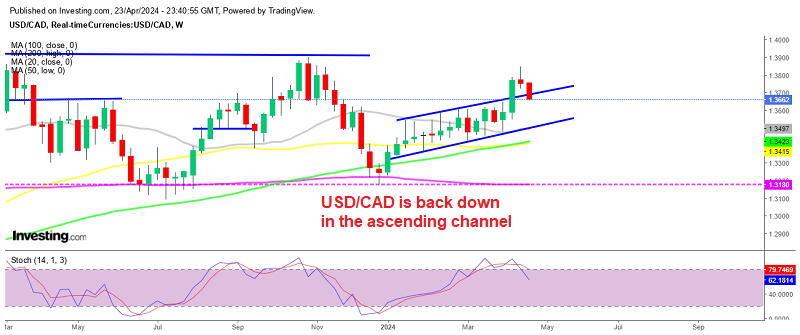
Forex Signals US Session Brief, Nov 14 – The Risk Is Off Again Amid Trade Deal Uncertainty
The sentiment has been mostly negative in financial markets in the last year, but in October the sentiment improved after US and China agreed to a partial trade deal, which sent risk assets higher. But, this month, the sentiment has turned negative again, especially this week, after comments from top US officials that the trade deal might be delayed for December. China officially delivered on one minor point in trade talks, removing restrictions on US poultry and meat products, which is a step in the right direction. But that wasn’t enough to improve the sentiment and safe havens such as GOLD and the JP are gaining momentum.
Overnight, the unemployment rate ticked higher in Australia which has been keeping the Aussie pretty bearish today, while industrial fell by more than 1% in China, which helped keep the sentiment negative. In Germany, we saw a 0.1% increase in the GDP for Q3, which showed that Germany beat a technical recession pretty narrowly, since the economy contracted in Q2. But, the negative retail sales from Britain and the lower employment change from the Eurozone for Q3 kept the sentiment negative. The ongoing protests in Hong Kong are also adding up to this, so commodity currencies have been pretty bearish today.
The European Session
- German GDP Q3 – The German economy has been weakening drastically. In Q2 the GDP contracted by 0.1% and expectations were for another such contraction in Q3, which would mean technical recession. But, the economy grew by 0.15 instead, so Germany avoided a recession just like the UK. German Ministry of Economy commented,saying that economic growth remains weak in Q3 and indicators do not signal a recovery yet. But business climate indicators send ‘first ray of hope’. Exports were up 1.1% in Q3 but companies do not expect noticeable recovery in the coming months.
- UK Retail Sales – Retail sales have been pretty weak in the UK recently, declining by 0.2% in August and falling flat in September. Today’s report was expected to show a 0.2% increase in sales during October, but they missed expectations, posting another decline of 0.1% this time. So, the softening trend continues for retail sales in UK. Core sales which exclude autos and fuel came in at -0.3% vs +0.2% expected MoM. Retail sales YoY also missed expectations,coming at 3.1% vs 3.7% expected, while core YoY sales came at 2.7% vs 3.4% expected.
- Flash Eurozone Employment and GDP Q3 – The German GDP for Q3 increased by 0.1%, which has helped the Eurozone GDP reach the estimates of 0.2% for the same quarter. But, employment change missed expectations of 0.2% and posted a weak 0.1% increase for Q3.
- China Removes Restrictions on US Poultry and Meat Products – This move had been previously announced as part of trade talks between US and China but is now made official. China’s customs have announced that they would lift restrictions on the import of poultry meat from the US, effective immediately. This is a step in the right direction, but only a small one.
- ECB Seems Content With Loose Monetary Policy – The European Central Bank cut deposit rates further in September to -0.50% and they restarted the QE programme this month. The ECB let traders know that they are done with monetary easing now. But that’s not so certain and comments from ECB members show that they would be more comfortable with extensive monetary and fiscal policy easing than the opposite. Below are some of their comments:
Comments by ECB chief economist, Philip Lane
- Euro exchange rate is not a target of monetary policy
- Loosening policy has had positive trade balance effect
- It is plausible that impact of rate cuts on the euro has intensified over time
- Especially since negative rates were introduced in 2014
- QE measures have had large and persistent effects on the euro
Comments by ECB vice president, Luis de Guindos
- Countries with fiscal space should do more
- Fiscal policy in the context of very interest low rates is much more powerful for the business cycle
- Data not pointing towards recession but growth will be below potential
- If euro area growth is below potential, need to pay close attention
- Should not be complacent about an inflationary shock in the euro area
- Monetary policy cannot address all problems in the world economy
- ECB still has ammunition but side effects of policy are becoming more evident
The US Session
- US PPI Inflation – The producer price index report from the US was released a while ago and it showed a nice improvement for October, after a 0.3% decline which we saw in the headline and core PPI numbers for September. headline CPI increased by 0.4% last month, beating expectations of 0.3%, while core PPI increased by 0.3%, beating expectations of 0.2% as well. PPI final demand YoY also came higher at 1.1% versus 0.9% estimated,while core PPI YoY came at 1.6% versus 1.5% estimated.
- Hawkish Comments From FED’s Clarida – FED’s Clarida was speaking in Washington DC earlier on, saying that the US economy at or close to Fed’s twin goals. He sees no evidence rising wages causing excess inflation. Inflation close to 2% goal, expectations at low-end. US inflation expectations reside at low-end of range he considers consistent with Fed’s price stability mandate. There’s no evidence rising wages are putting excessive upward pressure on inflation. Natural rate of unemployment extends 24% and below and includes current unemployment rate of 3.6%. Makeup strategies on inflation lead to better than average performance on both legs of dual mandate. The increase prime age participation a factor in restraining inflationary pressures.
- ECB’s Knot Sounding Balanced – The European Central Bank member Knot also commented a while ago. He said that financial conditions are not currently an impediment to growth or to a rise in inflation. Policymakers should act with more caution in using unconventional tools subject to more uncertainty, act more force fully with conventional instruments.
Trades in Sight
Bearish EUR/USD
- The trend has bearish this month
- The 50 SMA is pushing the price down
- The sentiment is negative

The 50 SMA is providing resistance for EUR/USD
EUR/USD was bullish during October, but it failed to break above 1.12 and eventually the price reversed back down, resuming the long term bearish trend after making a double top pattern on the daily chart. Since two weeks ago, the trend has been bearish and the sellers continue pushing lower. The 50 SMA has done a great job in providing resistance for this pair, so that’s a good indicator to go short from.
In Conclusion
The sentiment continues to be negative now, although we are seeing some USD strength now as it climbs against the JPY and Gold. FED’s chairman Jerome Powell is testifying at the US Congress today, so let’s post this forex brief and hear what he has to say.












